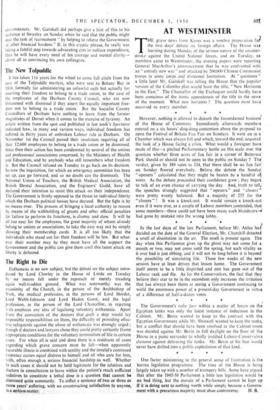The Right to Die
Euthanasia is no new subject, but the debate on the subject intro- duced by Lord Chorley in the House of Lords on Tuesday by no means fell under the reproach of merely treading again well-trodden ground. What was noteworthy was the unanimity of the Church, in the person of the Archbishop of York, the medical profession, in the persons of Lord Horder, Lord Webb-Johnson and Lord Haden Guest, and the legal profession, in the person of the Lord Chancellor, in rejecting with emphasis any idea of legalising voluntary euthanasia. Apart from the conviction of the doctors that _such a step would lay impossible responsibilities on them, the difficulty of providing effec- tive safeguards against the abuse of euthanasia was strongly urged ; though if doctors and lawyers chose they could pretty certainly frame appropriate conditions for the voluntary termination of life in certain cases. For when all is said and done there is a residuum of cases regarding which grave concern must be felt—when apparently incurable illness is combined with senility and the invalid's continued existence causes equal distress to himself and all who care for him, with, often enough a serious financial hardship as well. Whether in such cases it should not be held legitimate for the relatives and doctors in consultation to leave within the patient's reach sufficient sedatives to constitute a lethal dose is a question that cannot be dismissed quite summarily. To inflict a sentence of two or three or more yenrs' suffering, with no counteracting satisfaction to anyone,
is a serf nts:raattor- - • ,






































 Previous page
Previous page